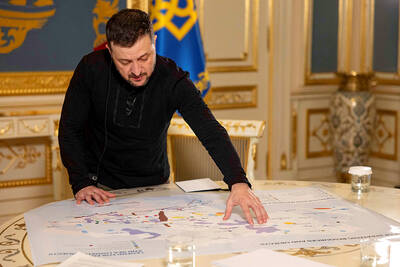The Khmer Rouge’s main jail chief admitted for the first time before Cambodia’s UN-backed war crimes tribunal yesterday that he had personally tortured a prisoner.
Duch, whose real name is Kaing Guek Eav, is on trial for overseeing the torture and execution of about 15,000 people at Tuol Sleng detention center in the late 1970s.
Duch’s confession came a day after a guard, Saom Meth, told the court that he saw his boss beat an inmate with a rattan stick.
“Regarding the testimony of comrade Meth, in general, it is true,” Duch told the court.
“The point that I went to torture a prisoner at Tuy [an interrogator’s] location, I would not deny it,” the 66-year-old former math teacher said.
But Duch said the most serious crime he committed was the “political indoctrination” of his staff at the prison, also known as S-21, to make them consider the inmates as enemies of the Khmer Rouge party.
“That was the most serious crime that I committed, and that I am responsible for more than 10,000 lives lost at S-21,” he said, adding that he was also “the one who initiated” the arrest of many people.
“All the crimes committed at S-21, regardless of forms of torture used and regardless whether the special forces used or transported the prisoners to be executed somewhere else, they had to do it because of my instruction,” he said.
“I do not deny all these crimes, I accept them,” Duch said, adding that he also used to enter a room where a “very humble” Briton was being interrogated.
Saom Meth had earlier told the court yesterday that he heard an ex-colleague report to record-keepers that many foreign prisoners, including Americans, were burned on the street.
The prison in the capital Phnom Penh was at the center of the Khmer Rouge’s brutal campaign of repression and was later turned into a genocide museum after the movement was overthrown by forces backed by Vietnam.

Thousands gathered across New Zealand yesterday to celebrate the signing of the country’s founding document and some called for an end to government policies that critics say erode the rights promised to the indigenous Maori population. As the sun rose on the dawn service at Waitangi where the Treaty of Waitangi was first signed between the British Crown and Maori chiefs in 1840, some community leaders called on the government to honor promises made 185 years ago. The call was repeated at peaceful rallies that drew several hundred people later in the day. “This government is attacking tangata whenua [indigenous people] on all

RIGHTS FEARS: A protester said Beijing would use the embassy to catch and send Hong Kongers to China, while a lawmaker said Chinese agents had threatened Britons Hundreds of demonstrators on Saturday protested at a site earmarked for Beijing’s controversial new embassy in London over human rights and security concerns. The new embassy — if approved by the British government — would be the “biggest Chinese embassy in Europe,” one lawmaker said earlier. Protester Iona Boswell, a 40-year-old social worker, said there was “no need for a mega embassy here” and that she believed it would be used to facilitate the “harassment of dissidents.” China has for several years been trying to relocate its embassy, currently in the British capital’s upmarket Marylebone district, to the sprawling historic site in the

‘IMPOSSIBLE’: The authors of the study, which was published in an environment journal, said that the findings appeared grim, but that honesty is necessary for change Holding long-term global warming to 2°C — the fallback target of the Paris climate accord — is now “impossible,” according to a new analysis published by leading scientists. Led by renowned climatologist James Hansen, the paper appears in the journal Environment: Science and Policy for Sustainable Development and concludes that Earth’s climate is more sensitive to rising greenhouse gas emissions than previously thought. Compounding the crisis, Hansen and colleagues argued, is a recent decline in sunlight-blocking aerosol pollution from the shipping industry, which had been mitigating some of the warming. An ambitious climate change scenario outlined by the UN’s climate

BACK TO BATTLE: North Korean soldiers have returned to the front lines in Russia’s Kursk region after earlier reports that Moscow had withdrawn them following heavy losses Ukrainian President Volodymyr Zelenskiy on Friday pored over a once-classified map of vast deposits of rare earths and other critical minerals as part of a push to appeal to US President Donald Trump’s penchant for a deal. The US president, whose administration is pressing for a rapid end to Ukraine’s war with Russia, on Monday said he wanted Ukraine to supply the US with rare earths and other minerals in return for financially supporting its war effort. “If we are talking about a deal, then let’s do a deal, we are only for it,” Zelenskiy said, emphasizing Ukraine’s need for security guarantees